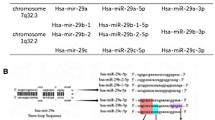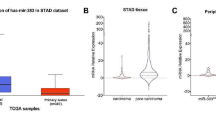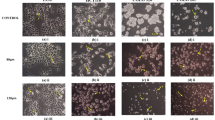Abstract
MicroRNA-31 (miR-31) plays important roles in colon cancer development. However, the underlying mechanism is still not clear. We have explored the functions of miR-31 on proliferation of colon cancer cells as well as the underlying mechanism. E2F2 was identified as a direct target of miR-31. miR-31 regulated the proliferation of colon cancer cells by targeting E2F2. Moreover, in the present study, E2F2 acted as a tumor suppressor in colon cancer by repressing the expression of survivin and regulating the expression of CCNA2, C-MYC, MCM4 and CDK2. A possible mechanism for the function of miR-31 on colon cancer proliferation is presented and indicates that miR-31 might become a target for anti-cancer drug design.







Similar content being viewed by others
References
Azkargorta M, Fullaondo A, Laresgoiti U, Aloria K, Infante A, Arizmendi JM, Zubiaga AM (2010) Differential proteomics analysis reveals a role for E2F2 in the regulation of the Ahr pathway in T lymphocytes. Mol Cell Proteomics 9:2184–2194
Carrington JC, Ambros V (2003) Role of microRNAs in plant and animal development. Science 301:336–338
Cekaite L et al (2012) MiR-9, -31, and -182 deregulation promote proliferation and tumor cell survival in colon cancer. Neoplasia 14:868–879
Creighton CJ et al (2010) Molecular profiling uncovers a p53-associated role for microRNA-31 in inhibiting the proliferation of serous ovarian carcinomas and other cancers. Cancer Res 70:1906–1915
Dong Q et al (2010) MicroRNA let-7a inhibits proliferation of human prostate cancer cells in vitro and in vivo by targeting E2F2 and CCND2. PLoS ONE 5:e10147
Dong Z, Zhong Z, Yang L, Wang S, Gong Z (2014) MicroRNA-31 inhibits cisplatin-induced apoptosis in non-small cell lung cancer cells by regulating the drug transporter ABCB9. Cancer Lett 343:249–257
Infante A et al (2008) E2F2 represses cell cycle regulators to maintain quiescence. Cell Cycle 7:3915–3927
Johnson DG, Degregori J (2006) Putting the oncogenic and tumor suppressive activities of E2F into context. Curr Mol Med 6:731–738
Lal A et al (2009) miR-24 Inhibits cell proliferation by targeting E2F2, MYC, and other cell-cycle genes via binding to “seedless” 3′UTR microRNA recognition elements. Mol Cell 35:610–625
Laurila EM, Kallioniemi A (2013) The diverse role of miR-31 in regulating cancer associated phenotypes. Genes Chromosom Cancer 52:1103–1113
Li T, Yang J, Lv X, Liu K, Gao C, Xing Y, Xi T (2014) miR-155 regulates the proliferation and cell cycle of colorectal carcinoma cells by targeting E2F2. Biotechnol Lett 36:1743–1752
Luo X, Burwinkel B, Tao S, Brenner H (2011) MicroRNA signatures: novel biomarker for colorectal cancer? Cancer Epidemiol Biomark Prev 20:1272–1286
Opavsky R et al (2007) Specific tumor suppressor function for E2F2 in Myc-induced T cell lymphomagenesis. Proc Natl Acad Sci USA 104:15400–15405
Pusapati RV, Weaks RL, Rounbehler RJ, McArthur MJ, Johnson DG (2010) E2F2 suppresses Myc-induced proliferation and tumorigenesis. Mol Carcinog 49:152–156
Valastyan S, Weinberg RA (2010) miR-31: a crucial overseer of tumor metastasis and other emerging roles. Cell Cycle 9:2124–2129
Wu N et al (2012) miR-125b regulates the proliferation of glioblastoma stem cells by targeting E2F2. FEBS Lett 586:3831–3839
Xanthoulis A, Tiniakos DG (2013) E2F transcription factors and digestive system malignancies: how much do we know? World J Gastroenterol 19:3189–3198
Xi S et al (2010) Cigarette smoke induces C/EBP-beta-mediated activation of miR-31 in normal human respiratory epithelia and lung cancer cells. PLoS ONE 5:e13764
Acknowledgments
This study was supported by Grants from National Natural Science Foundation of China (No. 81372331) and the Priority Academic Program Development of Jiangsu Higher Education Institutions.
Supporting information
Supplementary Table 1 - Primers for quantitative real-time PCR.
Supplementary Table 2 - Primers for plasmids construct.
Author information
Authors and Affiliations
Corresponding author
Electronic supplementary material
Below is the link to the electronic supplementary material.
Rights and permissions
About this article
Cite this article
Li, T., Luo, W., Liu, K. et al. miR-31 promotes proliferation of colon cancer cells by targeting E2F2. Biotechnol Lett 37, 523–532 (2015). https://doi.org/10.1007/s10529-014-1715-y
Received:
Accepted:
Published:
Issue Date:
DOI: https://doi.org/10.1007/s10529-014-1715-y




